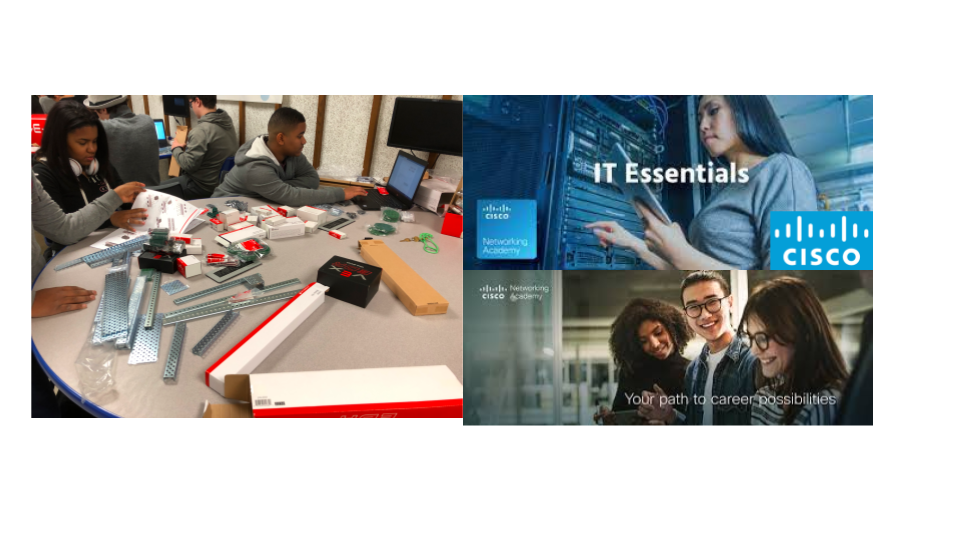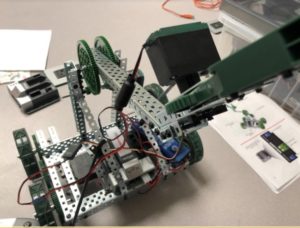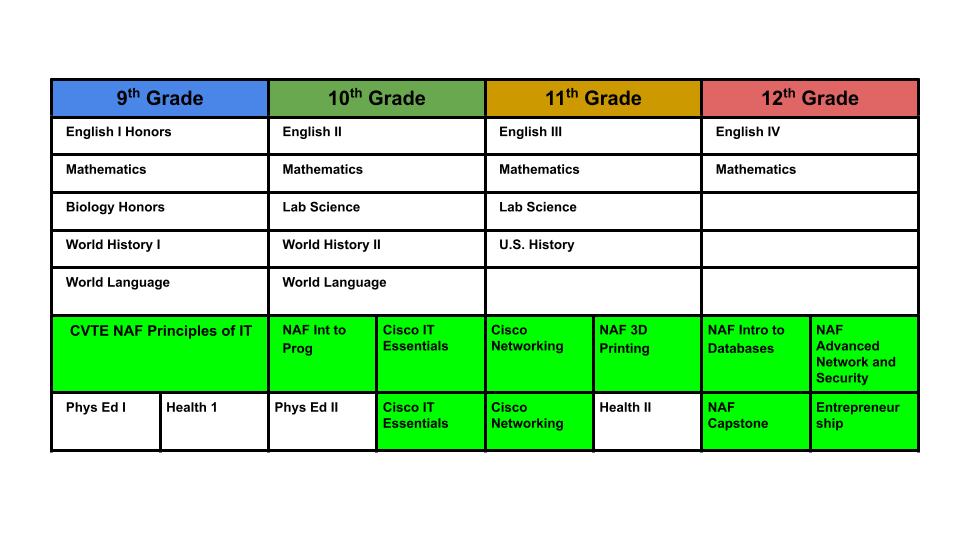
Program Overview






Information Technology (DESE’s Information Support Services and Networking)
Program Description: This DESE approved Chapter 74 program provides students with the fundamentals of Information Technology. Through hands-on real-world projects students will learn: basic robotics engineering concepts; object-oriented programming; how to assemble a computer and install operating systems; PC hardware and software maintenance; how to build 3D printers and design prototypes; network architecture; cyber security and database management. Upon successful completion of this program, students can earn college credit through articulation agreements with local community colleges.
Content: Computer and Internet Fundamentals, CISCO IT Essentials, CISCO Networking, Cyber Security, Vex Robotics, Python, 3D Printing, Databases, Cloud Computing, OSHA Safety, Entrepreneurship, College and Career Planning
Certifications: OSHA 10-hour General Industry Certification; CISCO IT Essentials, CISCO Networking
High Demand Jobs: Hardware Engineer, Help Desk Associate, Cyber Security Engineer, Network Administrator, IT Manager, Development Operations (DevOps) Engineer, Network Technician, Robotics Engineer, AI Machine Learning Engineer, Software Engineer
College Majors: Information Technology, Computer Engineering, Computer Science, Information Security, Network Security, Computer Information Systems, Electrical Engineering, Mechanical Engineering, Robotics Engineering
College and Industry Partners: HydraCor, Vicor, Kronos, Juniper Networks, Lawrence General Hospital, NECC, UMass Lowell, MassHire

Program Course Progressions
This program is an official Chapter 74 Program under DESE’s -Information Support Services and Networking (There is a statewide articulation agreement)
CVTE PRINCIPLES OF IT HONORS (9th Grade) – This is the first course scholars take in the CVTE Information Technology and Programming and Web Development Programs. It provides an overview of information technology and introduces scholars to the basics of hardware and software. Scholars examine hardware components including peripherals, connectors, and memory. Scholars explore aspects of computer software, learning and using common operating systems, software applications, and programming languages. Scholars will learn the basics of programming by programming robots, developing websites and with the use of Python. Scholars learn about types of networks and network topology, and they set up an email client/server connection. Scholars also consider contemporary issues such as security, privacy, and technological inequality. Scholars will strengthen their public speaking skills by presenting projects to community leaders. Finally, scholars explore career opportunities in IT.
CVTE CISCO IT ESSENTIALS (10th Grade) – The IT Essentials course covers the fundamentals of computer hardware and software and advanced concepts such as security, networking, and the responsibilities of an IT professional. Scholars who complete this course will be able to describe the internal components of a computer, assemble a computer system, install an operating system, and troubleshoot using system tools and diagnostic software. IT Essentials helps scholars prepare for entry-level Information & Communications Technology career opportunities and the CompTIA A+ certification, which helps scholars to differentiate themselves in the marketplace and advance their careers.
CVTE INTRODUCTION TO PROGRAMMING (10th Grade) – Introduction to Programming uses Python as a basis for learning general programming skills. Scholars learn programming principles by comparing Python to other programming languages. They use models as a way to quickly solve new problems using knowledge and techniques already learned. In addition to programming, scholars learn program design, documentation, formal debugging, and testing. Scholars will strengthen their public speaking skills by presenting projects to community leaders. Finally, scholars examine career opportunities in programming.
CVTE 3D PRINTING (11th Grade) – This class will introduce the concept of 3D modeling, prototyping, replication/construction and design. In addition to building a 3D printer from a kit, scholars will be producing 3D printed projects by designing printable 3D models using TinkerCad, a cloud based 3D modeling software.
CVTE INTRODUCTION TO NETWORKS (11th Grade) – Introduction to Networks introduces the architecture, structure, functions, components, and models of the Internet and other computer networks. The principles and structure of IP addressing and the fundamentals of ethernet concepts, media, and operations are introduced to provide a foundation for the curriculum. By the end of the course, scholars will be able to build simple LANs, perform basic configurations for routers and switches, and implement IP addressing schemes. Prerequisites: Passing Grade in NAF Principles of IT, NAF Intro to Programming and NAF IT Essentials/Computer Systems.
CVTE ADVANCED NETWORKING & SECURITY (12th Grade) – This course will cover the following topics Network Security, Compliance and Operational Security, Threats and Vulnerabilities, Application, Data and Host Security, Access Control and Identity Management and Cryptography. Scholars will practice the next level of network design and implementation with a focus on the security concerns in industry today.
CVTE DATABASE DESIGN (12th Grade) – Database Design is an introductory course in Databases using SQL Server. The course covers databases and their uses. Tables, indexes and foreign keys. You will learn simple SQL (Structured Query Language) DDL (Data Definition Language) and SQL DML (Data Manipulation Language). You will learn why Relational Databases are “Relational”.
CVTE CAPSTONE PROJECT (12th Grade) – The purpose of this capstone project is to demonstrate a scholar’s mastery and knowledge of what they have learned during their studies in information technology and apply them to real world applications. Working with a mentor, scholars will develop a proposal for a capstone project, integrating concepts and skills learned throughout their four years in the NAF Academy of IT. Each project must include a deliverable, such as a process, procedure, software or prototype. Scholars will be required to develop a comprehensive business model and marketing plan. At the end of the semester, scholars showcase and pitch their projects to a panel of judges at a Capstone Design Expo.
CVTE ENTREPRENEURSHIP (12th Grade) – This course teaches scholars to expand their knowledge of business marketing principles related to ownership and management of a business, traits and characteristics of successful entrepreneurs, and strategies of business management and marketing. Using the NFTE (Network for teaching Entrepreneurship) curriculum, this course teaches the entrepreneurial mindset alongside traditional business development skills. Scholars create original business models, either individually or with a partner, and pitch in a series of competitive events. This course is aligned to the Common Career Technical Core Standards for Business Management and Administration and The National Content Standards for Entrepreneurial Education.
Although this in not a requirement all CTE students are encouraged to participate in an Internship.
INTERNSHIP (this is a half credit course that can be taken during the school year or summer) The purpose of the Career Internship is to provide scholars with a meaningful workplace experience working closely with a professional in a chosen field. The scholars will also participate in classes where they will build a career portfolio, including resumes, cover letters, and ultimately, letters of recommendation. The scholars will also learn about interview and job search skills as well as labor laws and their rights in the workplace. This course runs two afternoons a week from 2:15-5 p.m. Scholars will receive ½ credit per semester for satisfactory completion of all requirements. Scholars must be at least 16 years old to participate.
Comparative Salary Data (April – June 2023)
Data below are for the Essex County area which includes cities like Andover, Haverhill, Lawrence, Lynn, Peabody and Salem, Massachusetts.
Entry level full-time jobs in these fields typically start at $22-$25 per hour and include benefits like health and dental insurance, retirement funding, paid sick leave and vacation time.
